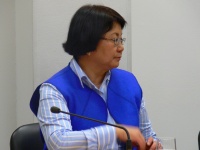Registration
You will receive an email confirming your registration.
IMGXYZ2449IMGZYXThe Tulip Revolution did not mark the emergence of democracy in Kyrgyzstan. To the contrary, since 2005, limits on political rights and freedoms and the strengthening of President Kurmanbek Bakiyev’s family rule have only increased, according to participants in a roundtable on the internal political situation in Kyrgyzstan held at the Carnegie Moscow Center.
Speakers representing Kyrgyz opposition parties included: Roza Otunbayeva, leader of the Social Democratic Party of Kyrgyzstan faction in the Jogorku Kenesh (Kyrgyz parliament), Irina Karamushkina, a member of the Social Democratic Party of Kyrgyzstan faction in the Jogorku Kenesh, and Gulnara Dzhurabayeva, coordinator for NGO relations of the Ata Meken Socialist Party.
Otunbayeva outlined the pressing issues of Kyrgyz internal politics as follows: amendments to the constitution of Kyrgyzstan that significantly boost the power of the president; corruption; and privatization of key industries. Karamushkina emphasized that the Kyrgyz opposition is under pressure, while the country faces social problems, islamization and demodernization.
According to Dzhurabayeva, the political institutions of Kyrgyzstan are eroding. Non-transparent decision-making, excessive strengthening of the position of the president and rampant systemic corruption all lead to a credibility crisis: the state is not trusted. As a result, Otunbayeva argued, people are more likely to turn to clans for protection and assistance, i.e. to the previous forms of social integration. However, given the fact that President Bakiyev is successfully incorporating the clan structure in his political system, this should not be seen as the birth of an independent civil society.
The representatives of the Kyrgyz opposition admitted that they were to blame for failing to push for serious political reforms in 2005. As a result of that inertia, the political system created by Kyrgyzstan’s first president, Askar Akayev, remains in place.
The roundtable was chaired by Alexey Malashenko.
